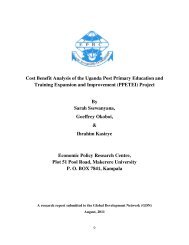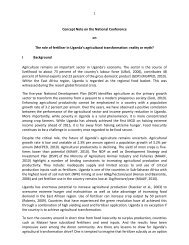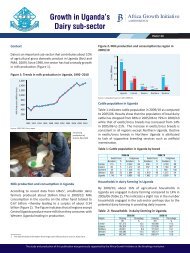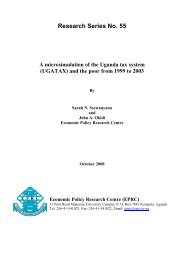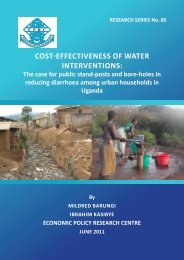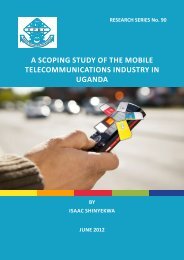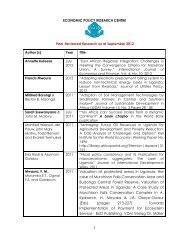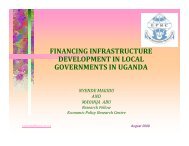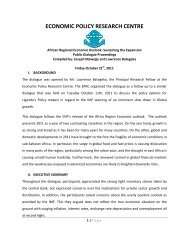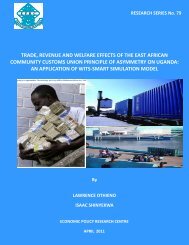The Political Context of Financing Infrastructure Development in ...
The Political Context of Financing Infrastructure Development in ...
The Political Context of Financing Infrastructure Development in ...
You also want an ePaper? Increase the reach of your titles
YUMPU automatically turns print PDFs into web optimized ePapers that Google loves.
<strong>The</strong> <strong>Political</strong> <strong>Context</strong> <strong>of</strong> <strong>F<strong>in</strong>anc<strong>in</strong>g</strong> <strong>Infrastructure</strong> <strong>Development</strong> <strong>in</strong> Local Government<br />
services or the implementation <strong>of</strong> projects <strong>in</strong> their areas. <strong>The</strong>se are legal niceties which do<br />
not necessary translate <strong>in</strong>to practical realities. Cases <strong>in</strong> po<strong>in</strong>t <strong>in</strong>clude the construction <strong>of</strong> the<br />
hydro-electricity dams <strong>in</strong> Kanungu district on river Ishasha and the construction <strong>of</strong> hydro<br />
electricity dam on river Nyagak <strong>in</strong> the newly created Zombo district <strong>in</strong> the West Nile region.<br />
In both cases the local councils are like any other bystander. <strong>The</strong>y largely simply watch what<br />
is tak<strong>in</strong>g place. <strong>The</strong>y can neither determ<strong>in</strong>e the pace <strong>of</strong> construction nor the eng<strong>in</strong>eer<strong>in</strong>g<br />
designs. In effect therefore, they do not regulate these projects. <strong>The</strong> projects are controlled<br />
and regulated from the centre. This shows that regardless <strong>of</strong> the law, the old say<strong>in</strong>g that;<br />
“whoever pays the piper calls the tune” still holds even when the governance system (regime)<br />
confesses devolution. While this may be imbedded <strong>in</strong> the politics <strong>of</strong> decentralization and<br />
national politics <strong>in</strong> an attempt to portray who is deliver<strong>in</strong>g what and therefore deserves a pat<br />
on the back by way <strong>of</strong> the number <strong>of</strong> votes <strong>in</strong> appreciation, it also revolves around the question<br />
<strong>of</strong> where power lies <strong>in</strong> the decentralized system with regard to <strong>in</strong>frastructure development<br />
and service delivery especially when resources are provided by one party dom<strong>in</strong>ated central<br />
government. <strong>The</strong> case <strong>of</strong> J<strong>in</strong>ja Municipality and Paidha town council can illustrate this.<br />
In J<strong>in</strong>ja municipality when the central market was burnt, the Municipal Council made plans<br />
to reconstruct it. <strong>The</strong> Islamic Bank was ready to fund the project but the Municipality could<br />
not go ahead because the central government frustrated the project partly because the<br />
Leadership <strong>of</strong> the Municipality did not belong to the rul<strong>in</strong>g party 3 . Although the market is now<br />
be<strong>in</strong>g reconstructed by funds from the African <strong>Development</strong> Bank, it is under the auspices <strong>of</strong><br />
the central government. Though the municipal eng<strong>in</strong>eer is coord<strong>in</strong>at<strong>in</strong>g the reconstruction<br />
project, council does not play a significant role. This is partly because <strong>of</strong> political and power<br />
dynamics and lack <strong>of</strong> own funds to implement the project.<br />
In the case <strong>of</strong> Paidha Town Council, to tarmac the road <strong>in</strong> the town, the money was got from<br />
the road fund. <strong>The</strong> central government went ahead and selected the contractor but gave the<br />
money to pay the contractor to the town council. 4 S<strong>in</strong>ce payment was to be made by the town<br />
council, ideally they are supposed to have played their oversight function. In reality however,<br />
the town council only acted as a conduit to pay the contractor. <strong>The</strong> contractor’s allegiance<br />
was not to the council but to the central government which selected the company. In an<br />
<strong>in</strong>terview with the Town Clerk <strong>of</strong> Paidha, he revealed that the council has fiscal autonomy<br />
only over local revenue, which is actually meagre. For example, accord<strong>in</strong>g to the LGFC (2009)<br />
the contribution <strong>of</strong> Local revenues to the total urban local government budget is between 30<br />
percent and 40 percent while for rural local governments, contribution <strong>of</strong> local revenue to<br />
the budgets is between 2percent and 3 percent. While contribution to the budget appears a<br />
bit high for urban local governments, some urban local governments are far below average.<br />
3 Interview with the Private Secretary <strong>of</strong> the Mayor <strong>of</strong> J<strong>in</strong>ja Municipality and the Senior Planner J<strong>in</strong>ja Municipal Council.<br />
4 Information obta<strong>in</strong>ed dur<strong>in</strong>g a consultative meet<strong>in</strong>g with the technical staff and political leaders <strong>of</strong> Paidha town council held <strong>in</strong> the town<br />
on 8th January 2010 dur<strong>in</strong>g the urban situation Analysis study commissioned by MoLG.<br />
14<br />
Economic Policy Research Centre - EPRC





